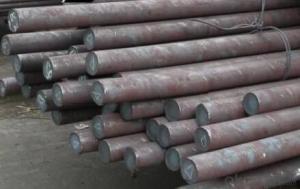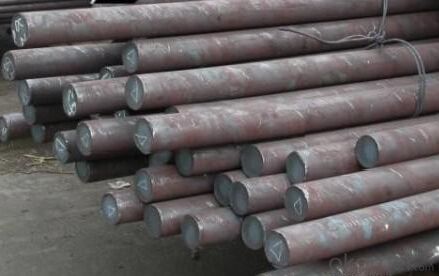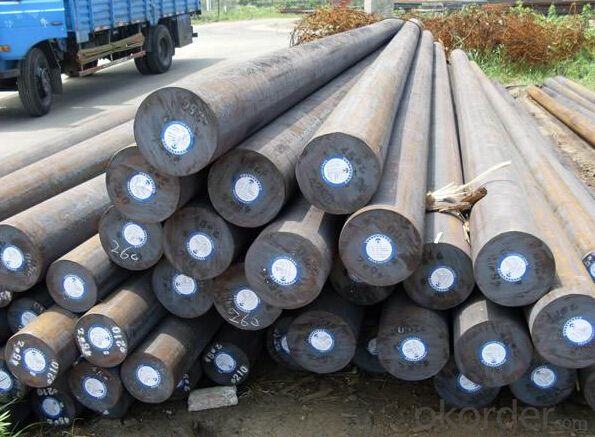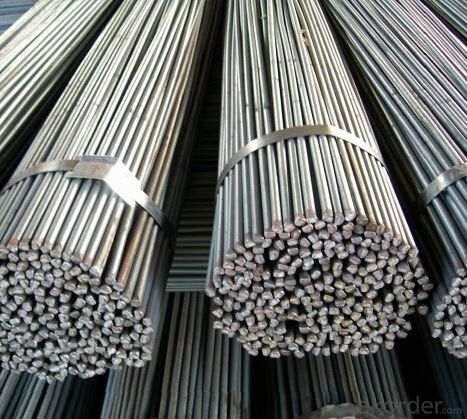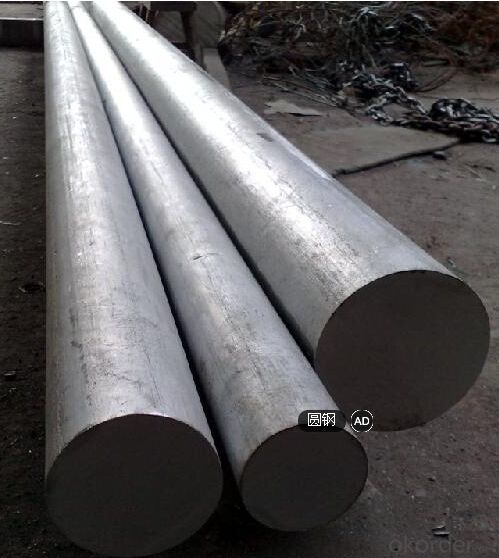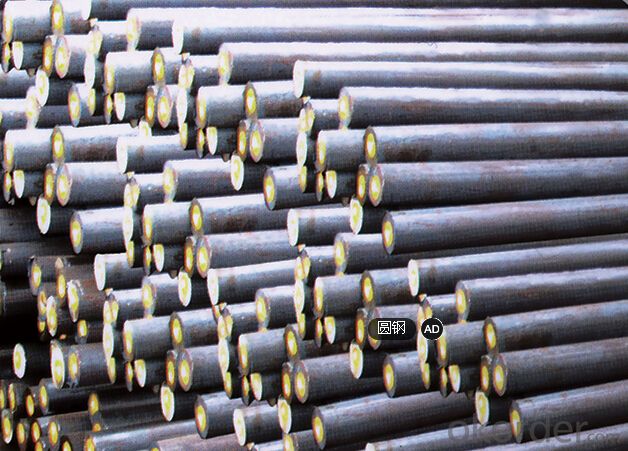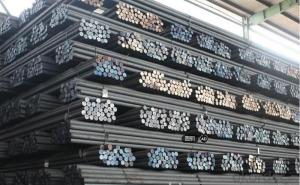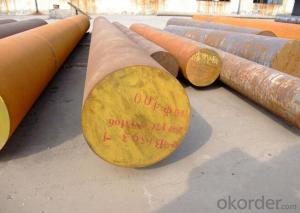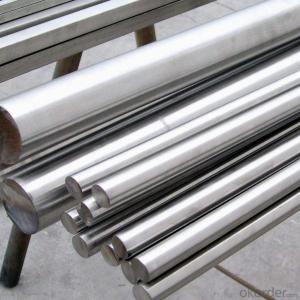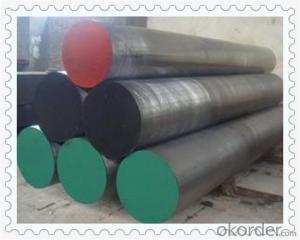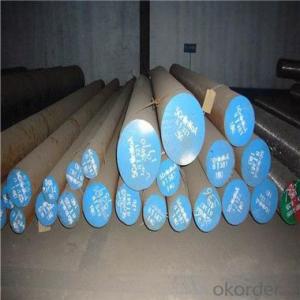Special Steel 8620H 40CrNiMoA Iron Steel Round Bar
- Loading Port:
- Shanghai
- Payment Terms:
- TT OR LC
- Min Order Qty:
- 3 m.t.
- Supply Capability:
- 100000 m.t./month
OKorder Service Pledge
OKorder Financial Service
You Might Also Like
Specification
Special Steel 8620H 40CrNiMoA Iron Steel Round Bar
Details Information of Special Steel 8620H 40CrNiMoA Iron Steel Round Bar
| Name | 8620H 40CrNiMoA Steel Round Bar |
| Shape | Round Bar/Square Bar/Flat Bar/Plate/Wire |
| Standard | GB/ASTM/SAE/AISI/DIN/JIS/EN/BS |
| Surface Treatment: | Black/Peeling/Polished/Machined |
| Delivery Condition: | Hot Rolled or Forged/Peeled or Black Surface |
| Test | SGS/UT 100% Elements Testing |
| Certificate: | ISO/Mill Certificate |
| Service: | 24 hours online service / |
| more than 20 years trading and manufacture | |
| Quality Assurance: | the third party inspection, such as SGS, BV, TUV…etc. is acceptable |
| Packaging Details: | Seaworthy Packaging or as per customer's packing instruction |
| Carbon structure round bar | Q195 Q235A Q235B 10# 20#-55# S45CB |
| Low alloy high strength round bar | Q345A/Q345C/Q345D Q345B Q345E |
| Alloy structure round bar | SAE51B20 20Cr 40Cr 40CrV 20CrMo/30CrMo/35CrMo/42CrMo 20CrMoA/30CrMoA/35CrMoA/42CrMoA/42Cr ML20CrMo/ML30CrMo/ML35CrMo/ML42CrMo B7/SCM435-440 20MnTiB 20CrMnMo 20CrMoH 42CrMoH 40MnB/40MnBH 30Mn2-40Mn2 27SiMn 50CrVA 30CrMnTi |
| Pinion steel | 20CrMnTi 20CrMnTiH 20CrMnTiHCS/20CrMnTiHLD Q20CrMnTi-1/Q20CrMnTi-2 |
| Sucker rod | 20-35CrMoA |
| Free-cutting steel | GT1215S |
| Spring steel | 60Si2MnA 65Mn |
| Ball bearing steel | GCr15 |
Chemical Composition of Special Steel 8620H 40CrNiMoA Iron Steel Round Bar
| C | Si | Mn | P | S | Cr | Ni | Cu |
| 0.17-0.24 | 0.17-0.37 | 0.35-0.65 | ≤0.035 | ≤0.035 | ≤0.25 | ≤0.25 | ≤0.25 |
| Tensile strength (σb/MPa) | Yield strength (σb/MPa) | Elongation (δ5/%) |
| ≥410(42) | ≥245(25) | ≥25 |
Company Introduction of Special Steel 8620H 40CrNiMoA Iron Steel Round Bar
CNBM International Corporation is the most import and export platform of CNBM group(China National Building Material Group Corporation) ,which is a state-owned enterprise, ranked in 270th of Fortune Global 500 in 2015.
With its advantages, CNBM International are mainly concentrate on Cement, Glass, Iron and Steel, Ceramics industries and devotes herself for supplying high quality series of refractories as well as technical consultancies and logistics solution.
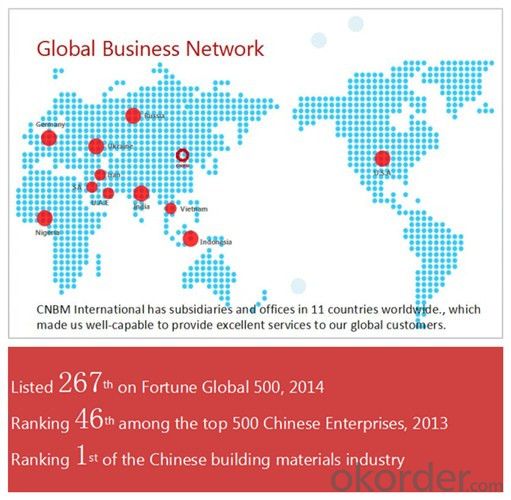
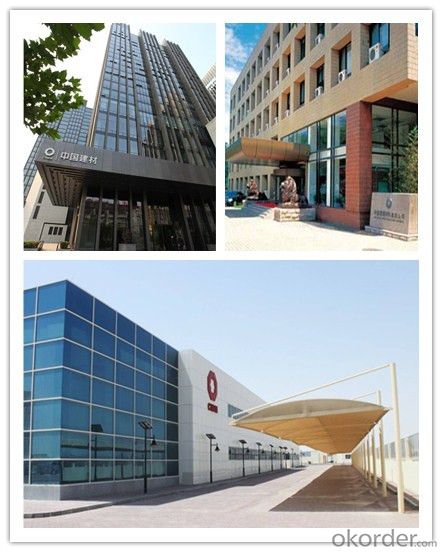
Certificates of Special Steel 8620H 40CrNiMoA Iron Steel Round Bar
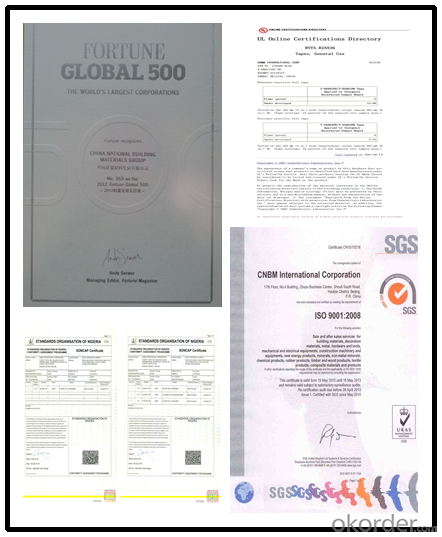
Packaging & Delivery of Special Steel 8620H 40CrNiMoA Iron Steel Round Bar
Packaging Detail | Sea worthy packing /as per customer's packing instruction |
Delivery Detail | 15 ~ 40 days after receiving the deposit |
Products show of Special Steel 8620H 40CrNiMoA Iron Steel Round Bar
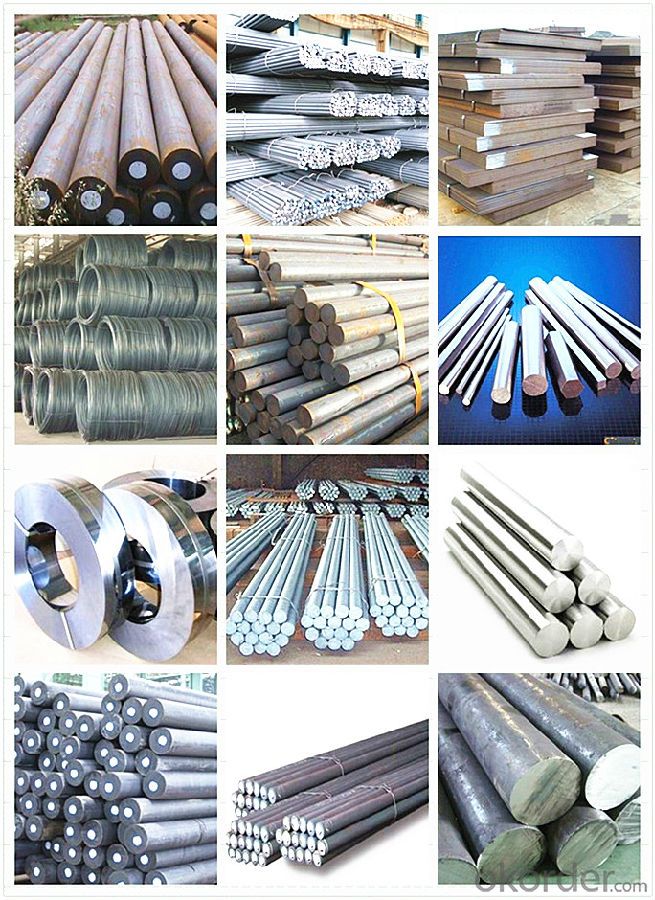
FAQ
Are you a trading company or manufacturer? | Manufacturer |
What’s the MOQ? | 3 metric ton |
What’s your delivery time? | 15-35 days after downpayment received |
Do you Accept OEM service? | Yes |
what’s your delivery terms? | FOB/CFR/CIF |
What's the Payment Terms? | 30% as deposit,70% before shipment by T/T |
Western Union acceptable for small amount. | |
L/C acceptable for large amount. | |
Scrow ,Paybal,Alipay are also ok | |
Why choose us? | Chose happens because of quality, then price, We can give you both. Additionally, we can also offer professional products inquiry, products knowledge train (for agents), smooth goods delivery, excellent customer solution proposals. |
What's your available port of Shipment? | Main Port, China |
What’s your featured services? | Our service formula: good quality+ good price+ good service=customer's trust
|
Where are your Market? | Covering more than 160 countries in the world |
- Q: What are the different types of case-hardening steel?
- There are several different types of case-hardening steels, including carburizing steel, nitriding steel, and cyaniding steel. These steels are specifically designed to undergo a surface-hardening process, where the outer layer of the steel is made harder while maintaining a tough core. Carburizing steel is treated with carbon-rich materials to increase its carbon content, while nitriding steel is exposed to nitrogen to form a hard surface layer. Cyaniding steel is treated with cyanide salts to produce a hard and wear-resistant surface. Each type of case-hardening steel has its own specific properties and applications.
- Q: How does wear-resistant steel protect against abrasive wear?
- Wear-resistant steel protects against abrasive wear by having a higher hardness and toughness compared to the material it is protecting. This allows it to withstand the impact and friction caused by abrasive particles, reducing the wear and increasing the lifespan of the steel.
- Q: What are the different surface treatments available for special steel?
- There are several surface treatments available for special steel, including galvanizing, powder coating, electroplating, passivation, and nitriding. These treatments enhance the steel's durability, corrosion resistance, appearance, and overall performance in various applications.
- Q: What are the environmental impacts of using special steel?
- Special steel can cause several environmental effects. To begin with, the extraction of raw materials like iron ore and coal for special steel production results in deforestation, destruction of habitats, and loss of biodiversity. This mining process also releases pollutants into the air, soil, and water, contributing to pollution. Special steel production also emits greenhouse gases, especially carbon dioxide (CO2), during manufacturing. The high temperatures required to melt and shape the steel, along with the energy-intensive processes involved, lead to significant CO2 emissions that contribute to climate change. Moreover, the transportation of special steel has its own environmental consequences. The shipping and logistics involved in transporting the steel from production facilities to end-users generate additional greenhouse gas emissions, air pollution, and fuel consumption. Additionally, the disposal of special steel products at the end of their lifecycle poses environmental challenges. If not properly recycled or disposed of, steel products can end up in landfills, taking up valuable space and potentially releasing harmful substances into the environment. Despite these environmental impacts, it is important to acknowledge that special steel is frequently used in various industries due to its durability, strength, and resistance to corrosion. Efforts are being made to mitigate these impacts by adopting cleaner production methods, such as recycling and utilizing renewable energy sources in the steel manufacturing process. Additionally, initiatives like carbon capture and storage are being explored to reduce greenhouse gas emissions from steel production. In conclusion, although special steel offers numerous benefits, it is crucial to balance these advantages with the need to minimize its environmental impacts through sustainable production and responsible disposal practices.
- Q: What are the specific requirements for special steel used in the mining drill bit industry?
- The mining drill bit industry has specific requirements for the special steel it utilizes, which focus on durability, toughness, and resistance to wear and corrosion. To begin with, the steel employed in mining drill bits must possess exceptional durability to endure the harsh and demanding conditions found in the mining environment. The drill bits are exposed to high levels of impact, vibration, and stress, necessitating high strength and hardness in the steel to prevent deformation or breakage. Moreover, toughness plays a crucial role in drill bit steel as it must withstand the repetitive and intense forces encountered during drilling operations. The steel should exhibit good fracture toughness to resist crack propagation and prevent premature failure. Additionally, wear resistance is of utmost importance for drill bit steel, as it must retain its cutting edge and performance over long periods. The steel needs to have high wear resistance to withstand the abrasive nature of the rocks and minerals being drilled. Furthermore, apart from wear resistance, the steel utilized in mining drill bits must also demonstrate resistance to corrosion. The mining environment often involves exposure to water, chemicals, and various corrosive agents. Hence, the steel should possess suitable corrosion resistance properties to prevent rusting and degradation. In conclusion, the special steel employed in the mining drill bit industry must fulfill these specific requirements of durability, toughness, wear resistance, and corrosion resistance to ensure reliable and efficient drilling operations in the mining sector.
- Q: What are the requirements for special steel used in oil and gas equipment manufacturing?
- The requirements for special steel used in oil and gas equipment manufacturing are quite stringent due to the demanding operating conditions and harsh environments that these materials will be exposed to. Some of the key requirements include: 1. Corrosion Resistance: Special steel used in oil and gas equipment must have excellent resistance to corrosion, especially in the presence of various corrosive fluids such as oil, gas, and saltwater. This helps to prevent degradation and premature failure of the equipment. 2. High Strength: The steel must possess high strength and toughness to withstand the extreme pressures, temperatures, and mechanical stresses encountered in oil and gas operations. This ensures that the equipment can perform reliably under demanding conditions. 3. Heat Resistance: Oil and gas equipment often operates at elevated temperatures, especially in downstream processes such as refining and petrochemical applications. Special steel used in these applications must be able to maintain its mechanical properties and structural integrity even at high temperatures. 4. Weldability: Welding is a common joining technique used in the fabrication of oil and gas equipment. The special steel should have good weldability, allowing for efficient and reliable welding processes without compromising the overall strength and integrity of the equipment. 5. Fatigue Resistance: Oil and gas equipment is subjected to cyclic loading, which can lead to fatigue failure if the material is not properly designed to withstand these repetitive stresses. Special steel must possess good fatigue resistance properties to ensure long-term durability. 6. Low Temperature Properties: In certain applications, such as offshore drilling or arctic environments, the equipment may be exposed to extremely low temperatures. The special steel should exhibit excellent toughness and ductility at low temperatures to prevent brittle fracture. 7. Chemical Composition Control: The chemical composition of the special steel must be tightly controlled to ensure consistent and predictable material properties. This involves strict control over the levels of various alloying elements, impurities, and trace elements to meet the specific requirements of the oil and gas industry. Meeting these requirements is crucial for the safe and reliable operation of oil and gas equipment. Special steel manufacturers work closely with industry standards and specifications to develop and provide materials that meet these demanding requirements, ensuring the integrity and performance of the equipment in the oil and gas sector.
- Q: What are the thermal conductivity properties of special steel?
- Special steel, also known as alloy steel, exhibits high thermal conductivity properties. This is due to the presence of various alloying elements, such as chromium, nickel, and manganese, which enhance heat transfer. The specific thermal conductivity value of special steel depends on its composition and can vary, but it generally has good heat transfer capabilities.
- Q: How does special steel perform in terms of hardness?
- Special steel is known to exhibit excellent hardness properties due to its unique composition and manufacturing processes. It is specifically designed to have a higher level of hardness compared to regular steel, making it extremely resistant to wear, abrasion, and deformation.
- Q: How is the hardness of special steel measured?
- Various methods are typically used to measure the hardness of special steel. The most common method is the Rockwell hardness test, which involves pressing a diamond or hardened steel ball into the surface of the steel to measure the depth of penetration. The Rockwell hardness number is determined based on the difference in depth before and after the application of a minor load and a major load. Another widely used method is the Brinell hardness test, which involves indenting a hardened steel or carbide ball into the steel surface and measuring the diameter of the indentation. The hardness is calculated based on the applied load and the diameter of the impression. Additionally, for specific applications, other methods like the Vickers hardness test and the Knoop hardness test are often employed. These tests require indenting the steel surface with a diamond pyramid to measure the diagonal lengths or the indentation depth, respectively. Ultimately, the hardness of special steel is determined by assessing its resistance to indentation or penetration. This information is valuable in understanding the mechanical properties of the steel and determining its suitability for different applications.
- Q: What are the properties of copper alloys?
- Copper alloys have various properties such as high electrical and thermal conductivity, excellent corrosion resistance, good strength and ductility, as well as a pleasing aesthetic appearance. They are also known for their antimicrobial properties and are commonly used in electrical wiring, plumbing systems, and various industrial applications.
Send your message to us
Special Steel 8620H 40CrNiMoA Iron Steel Round Bar
- Loading Port:
- Shanghai
- Payment Terms:
- TT OR LC
- Min Order Qty:
- 3 m.t.
- Supply Capability:
- 100000 m.t./month
OKorder Service Pledge
OKorder Financial Service
Similar products
Hot products
Hot Searches
Related keywords
